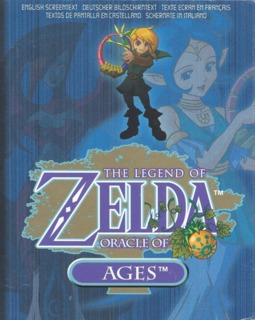The Oracle games are indeed shining achievements.
NOTE: This review talks about both games
The Good:
+The story of both games is solid
+8 dungeons
+some great sidequests and mini games in between
+wonderful graphics that show off the graphic capabilities of the system
+Some fun benefits come from having both games
The Bad:
-some repetitive tunes can get annoying after awhile
-sometimes gets hard to the point of frustration
-trading quests are too long
In the Oracle of Seasons, you are whisked away by the Triforce to a far off land, only to witness the kidnapping of a powerful Oracle (and a mighty good dancer) though I won't reveal her name. Your task sounds simple enough: collect all eight Essences of Seasons and restore power to the Maku Tree and defeat evil. But of course the catch is, with every Essence, there's a puzzle-filled, monster-infested dungeon to go with it!
Yes, the story is similar to a lot of other Zelda games, but it's still interesting in my opinion. In Ages, a different Oracle is captured by a different villain, but there are still eight dungeons. In this one, however, there are eight special instruments you must collect.
In Oracle of Seasons (OoS) you obtain a special item called the rod of Seasons, which has the power to let you change the season at will. There are four seasons (spring, summer, fall, and winter) but the first four dungeons have to be completed before your rod can have every seasons power at its disposal. To change the season, you must wave your rod from atop a stump, changing the season to whatever you wish.
Some truly fantastic puzzles come from using the Rod of Seasons. Say you must go a certain way, but a tree full of leaves blocks your way. With the power of winter, though, that healthy tree now becomes a withered, leafless tree, which now allows you to pass through. Other seasons have different effects. In summer, vines grow up tall ledges. In fall, hole are filled in by leaves, and mushrooms grow. And in spring, special flowers can shoot you up to higher places. It works well, and is a lot of fun.
In Oracle of Ages (OoA) it is a little different. Using the Harp of Ages, special songs open up time travel pads that allow you to travel to the past and back to the present at will. Many puzzles come out of this. For example, a seed planted in the past is a nice tall tree in the present. Or a boulder blocking your path in the present is no longer there in the past.
I personally like changing the seasons in OoS better than the time travel in OoA. OoS has an abundance of stumps, and changing seasons is easier to work with. OoA's time travel can be a bit of a hassle at times, and can get kind of confusing.
Of course new and old items come into play while in the dungeons, and all deliver fun in the true Zelda fashion.
A new item found in the Oracle games are special seeds that give you special abilities. Pegasus seeds, for example, allow you to run fast for a period of time. Ember seeds will set fires to things. There are five types of seeds, and all are very helpful and are used many times throughout the game.
A lot of aspects of the two games are the same. It's just that each has a different theme and a different world. In OoS, the later dungeon bosses get incredibly challenging, and even got hard to the point of utter frustration for me.
This fact is not helped by the way in which a powerful sword is obtained: a long trading quest that can be hard to figure out. If you play the game without a sword upgrade, you will have one tough time taking down bosses with a measly wooden sword.
People say that OoS focuses more on action, while OoA focuses more on puzzles. I do think that OoA's bosses are a little easier, but both games offer great puzzles and action.
There is an added bonus for owning both games. Upon completing either of the two, you get a pass code which can be entered when you start the other game, which lets you start with four hearts instead of three. Also, you get the chance for more upgrades of your items like your bomb and seed bag, and there is even an extra final boss fight! Good luck beating that, though, because it is only meant for the experienced, dedicated players.
By going back to the game you previously beat, you can get special pass codes from characters in the game that can be put in your other game for some really cool stuff. This is a really nice feature and is an added incentive to buy both games.
Graphics are great. They really show off the capabilities of the system. The music is great also, until it starts getting repetitive, and when it's MIDI, the repetitiveness can get downright annoying.
The two Oracle games really are wonderful. They have few flaws, and the rest of the game is so much fun anyway you won't worry too much about the negatives. What is really surprising is the length of both games. They have eight dungeons and a lot of stuff in between. These can still be found, whether by internet or a used/retro game store, and all Zelda fans should have them.

